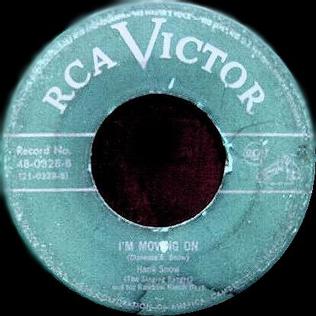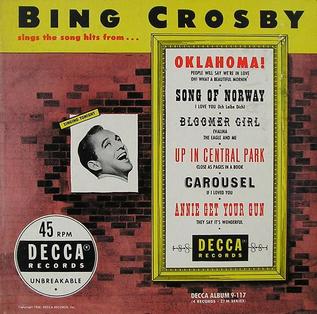Related Research Articles
"Because" is a song with music and lyrics by Guy d'Hardelot and English lyrics by Edward Teschemacher, originally published in 1902.
"If I Give My Heart to You" is a popular song written by Jimmy Brewster, Jimmie Crane, and Al Jacobs. The most popular versions of the song were recorded by Doris Day and by Denise Lor; both charted in 1954.
"The Breeze and I" is a popular song.
"Born to Be with You" is a song by the American female vocal quartet The Chordettes. Written by Don Robertson, the song was released in 1956. The song reached a position of number five on the pop charts in the United States. In Ireland, Butch Moore & The Capitol Showband took it to No. 1 in 1965.
"All My Love" is a 1950 popular song. The subtitle, in brackets, is Bolero. The music was written by Paul Durand. French lyrics under the title "Bolero" were written by Henri Contet, the English lyrics by Mitchell Parish.
"(Why Did I Tell You I Was Going To) Shanghai" is a popular song written by Bob Hilliard (lyricist) and Milton De Lugg (composer).

"White Christmas" is an Irving Berlin song reminiscing about an old-fashioned Christmas setting. The song was written by Berlin for the 1942 musical film Holiday Inn. The composition won the Academy Award for Best Original Song at the 15th Academy Awards.
"Dear Hearts and Gentle People" is a popular song published in 1949 with music by Sammy Fain and lyrics by Bob Hilliard. The song refers to the singer's hometown, and different versions allude to a range of U.S. states.
"Chattanoogie Shoe Shine Boy" is a popular song written by Harry Stone and Jack Stapp and published in 1950. It is the signature song of Red Foley who recorded it in late 1949. The song has been covered by many artists, including Bing Crosby, Frank Sinatra, and Faron Young who scored a hit with the song in 1959.
"Swinging on a Star" is an American pop standard with music composed by Jimmy Van Heusen and lyrics by Johnny Burke. It was introduced by Bing Crosby in the 1944 film Going My Way, winning an Academy Award for Best Original Song that year, and has been recorded by numerous artists since then. In 2004, it finished at No. 37 in AFI's 100 Years...100 Songs survey of top tunes in American cinema.

"You'd Be Surprised" is a song written by Irving Berlin in 1919 which Eddie Cantor interpolated it into Ziegfeld's Follies of 1919. Cantor soon recorded it and it became a major hit. Other popular versions in 1920 were by the All-Star Trio and by Irving Kaufman.

"The Band Played On", also known as "Casey Would Waltz with a Strawberry Blonde", is a popular song. It was written in 1895 with lyrics by John F. Palmer and music by Charles B. Ward (1865–1917).
"It Isn't Fair" is a popular song written by Richard Himber, Frank Warshauer, and Sylvester Sprigato and published in 1933. Isham Jones and His Orchestra had a hit with it the same year.

"I'm Moving On" is a 1950 country standard written by Hank Snow. It was a success in the record charts and has been recorded by numerous musicians in a variety of styles.
"What's New?" is a 1939 popular song composed by Bob Haggart, with lyrics by Johnny Burke. It was originally an instrumental tune titled "I'm Free" by Haggart in 1938, when Haggart was a member of Bob Crosby and His Orchestra. The tune was written with a trumpet solo, meant to showcase the talents of band-mate Billy Butterfield. Crosby's orchestra recorded "I'm Free" the same day it was written.

"Still" is a 1963 single by Bill Anderson. "Still" was Anderson's second number one on the country chart, staying at the top spot for seven non-consecutive weeks. The song crossed over to the pop chart, peaking at number eight. Anderson performed this song on the finale of the 1977-1978 ABC game show The Better Sex which he co-hosted with Sarah Purcell.
"Walking the Floor Over You" is a country music song written by Ernest Tubb, recorded on April 26, 1941 in Fort Worth, Texas, and released in the United States that year.
"Sioux City Sue" is a 1945 song and a 1946 movie. Lyricist Ray Freedman and composer Dick Thomas wrote the song. Thomas recorded the song in February 1945 for National Records and it was a number one Country charts hit for him. The song was Thomas' first chart entry on the Juke Box Folk Records chart and was also his most successful release: "Sioux City Sue" spent four weeks at number one on the Country charts during a stay of twenty-three weeks. The Dick Thomas version also reached Billboard's Best-selling Record charts attaining the No. 16 position.
"Ciribiribin"[tʃiribiriˈbin] is a merry Piedmontese ballad, originally in three-quarter time, composed by Alberto Pestalozza in 1898 with lyrics by Carlo Tiochet. It quickly became popular and has been recorded by many artists. Decades later it enjoyed continued popularity with swing and jazz bands, played in four-four time.

Bing Crosby Sings the Song Hits from Broadway Shows is a Decca Records compilation 78rpm album of phonograph records by Bing Crosby featuring some of the hits from Broadway musicals.
References
- ↑ Whitburn, Joel (1973). Top Pop Records 1940-1955. Record Research.
- ↑ "A Bing Crosby Discography". Bingmagazine.co.uk. Retrieved September 19, 2016.
- ↑ Whitburn, Joel (1986). Joel Whitburn's Pop memories 1890-1954 . Wisconsin, USA: Record Research Inc. p. 514. ISBN 0-89820-083-0.